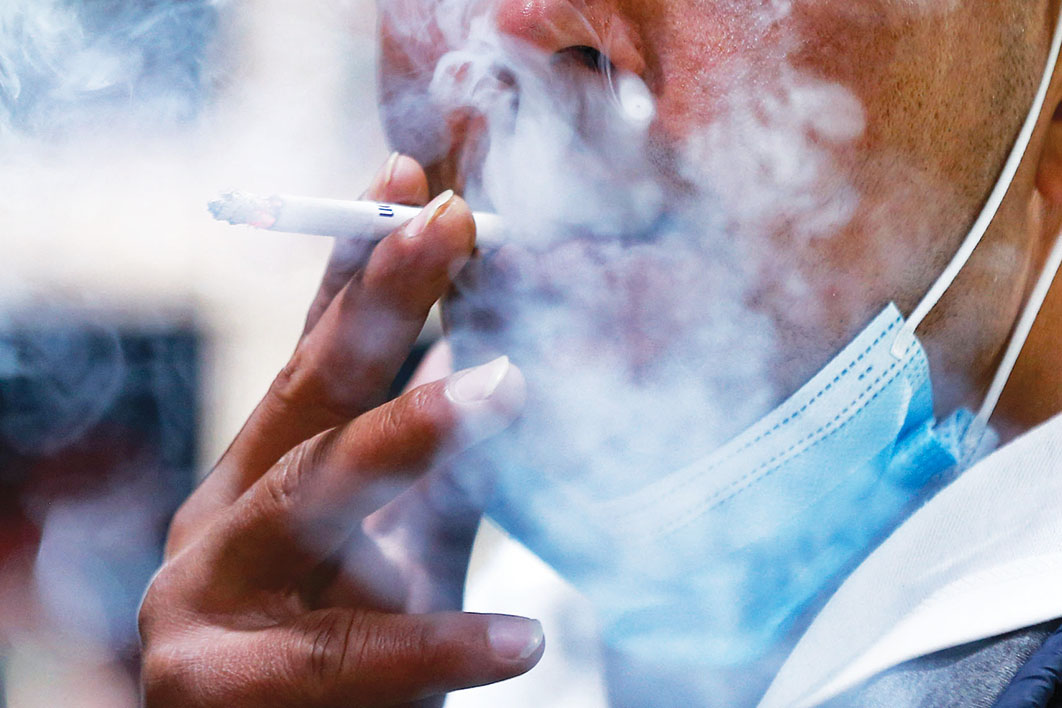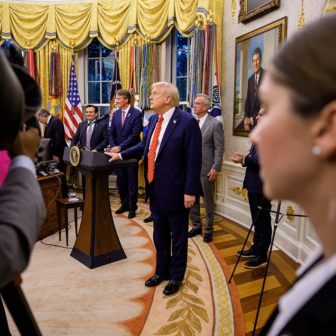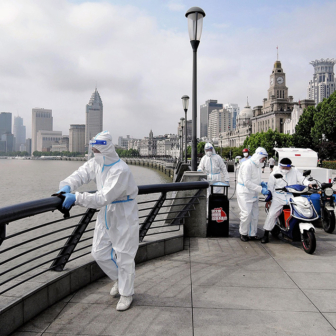The conversation was upbeat when big investors dialled in for a conference call with Coca-Cola executives on 21 April last year. On the agenda were the company’s first-quarter results and the expected impact of Covid-19 on its bottom line.
Despite the disruption, the company’s chairman and chief executive, James Quincey, was optimistic. Twice he told the investors that history showed the company would emerge stronger from the crisis. “While there are still many unknowns ahead, we do know that over our 134 years of business we’ve seen many types of crisis, be they military, economic, or pandemic, and the Coca-Cola Company has always emerged stronger in the end,” he said.
The transcript of the call also records that the investors on the line — representing Deutsche Bank, Goldman Sachs, Barclays Capital and other companies — were told how Coca-Cola was supporting relief efforts in “markets impacted across the globe.”
Coca-Cola is not the only company to have looked for opportunities during the pandemic. When public health advocates put out a call last July for examples of unhealthy industries seeking to capitalise on the disruption, they received several hundred documented examples from more than ninety countries.
These showed how alcohol, tobacco, fossil fuel, gambling and ultra-processed food companies had used the pandemic to promote corporate goals, whether through marketing and sales, influencing government policy, or generating positive publicity using philanthropic and other “corporate social responsibility” initiatives, or CSRs. (The latter have less flatteringly been dubbed “crisis washing.”) The pandemic has created new opportunities for companies to meet with politicians and policymakers by positioning themselves as partners of governments, health agencies and charities.
These findings come in a report, Signalling Virtue, Promoting Harm: Unhealthy Commodity Industries and COVID-19, published jointly last year by the NCD Alliance, an international network that seeks to improve how governments prevent and control non-communicable diseases, and SPECTRUM, a multi-university, multi-agency British research consortium.
A “striking theme” in the submissions, the report says, was how often unhealthy industries sought to associate their products with the work of health professionals, emergency services and other frontline workers during the pandemic. Philip Morris International donated fifty ventilators through its Greek subsidiary to intensive care units in Greece, for example. Other tobacco and alcohol companies made donations, including medical equipment and personal protective equipment, to Red Cross organisations in many countries.
In the United States, a McDonald’s campaign offered healthcare workers a free “thank you meal” if they shared a selfie of themselves with the meal. For each selfie, the franchise promised a meal coupon to the local food bank. In New Zealand, the United States and Britain, Krispy Kreme offered free doughnuts to healthcare and other frontline workers. In Russia, Heineken’s local subsidiary donated meals and its energy drink to doctors and nurses on night shift. In Adelaide, Lifeline used social media to thank Red Bull Australia for the “surprise delivery [of energy drinks] to help keep our Crisis Supporters energised as they answer calls for support.”
Several companies referred to their Covid-19 response in specially branded products and promotions. In China, a partnership between PepsiCo and the People’s Daily led to the release of limited edition newsprint-style soft drink labels celebrating health workers, scientists and hospital builders. In Mexico, Coca-Cola quickly produced gracias cans and bottles listing workers involved in the Covid-19 response. In Canada, a Subway fast-food franchise offered a free face mask with every two sandwiches purchased in a deal advertised as a great way to “protect you and your kids.” Alcohol companies in several countries created branded masks.
Marketing by infant formula companies in Vietnam, Cambodia and China capitalised on parents’ pandemic anxieties, including by promoting the “alleged immune-boosting potential of milk formula.” In France and Britain, food giant Danone produced ads targeting concerned parents of babies “born into the pandemic,” which directed parents to a “support and information” site hosted by their Aptamil brand. In Mexico, Nestlé, YSA Pharmacies and FEMSA, the country’s Coca-Cola bottler, breached the International Code of Marketing of Breast-milk Substitutes by offering to “gift” formula to vulnerable families for every can of infant or toddler milk purchased.
The Signalling Virtue report contains many more examples and warns that its findings “raise concerns about the prospect of a corporate capture of Covid-19 in which the involvement of unhealthy commodity industries in the pandemic response risks directing public policy efforts away from broader health and social goals and towards the entrenchment of industry interests.”
Lucy Westerman, an Australian who lives in England’s Midlands, was one of the report’s co-authors. When she presented its findings to the recent Preventive Health Conference 2021 in Perth, she described one example of marketing that she found “particularly tasteless.” In Brazil, brewer Karsten created a graphic in the style of their logo to resemble a pair of lungs, with the slogan “Good beer is like air: you can’t live without it,” and encouraged consumers to follow three key tips to survive with Karsten — isolate, use sanitiser and drink beer for fun.
Westerman tells me she is alarmed that companies whose products contribute to the rising incidence of cardiovascular and respiratory disorders, diabetes, dementia and other non-communicable diseases have sought to position themselves as part of “the solution” to the pandemic, given that people with those conditions are at increased risk from Covid-19.
Globally, about forty-one million people die each year from these diseases, many of which are associated with ultra-processed foods, alcohol and other unhealthy products. Just this week, the Financial Times revealed that an internal Nestlé report had acknowledged that more than 60 per cent of the company’s mainstream products wouldn’t meet a “recognised definition of health” and “some of our categories and products will never be ‘healthy’ no matter how much we renovate.”
“It’s been quite astonishing to watch it all play out,” says Westerman of the companies’ pandemic strategies. “These behaviours are not unfamiliar; they are things we see anyway. But what we notice is that it was amplified; the pivoting was so rapid right at the beginning of the pandemic. The industries start literally saying, ‘We are part of the solution.’”
On a more positive note, Westerman also points to how the pandemic has helped increase awareness of these diseases’ toll, with some governments stepping up efforts to tackle their causes. Some Mexican cities have banned the sale of junk foods to children, while the British government is taking serious steps to tackle obesity and South Africa has restricted tobacco and alcohol sales during lockdown.
“Covid has been an absolute wake-up call,” says Westerman. “I think governments are now aware of how unhealthy their populations are; in that first wave, most of the people who died had underlying conditions like obesity and diabetes. If we’ve learnt anything from this pandemic, it’s that we can no longer allow vested interests to get in the way of sound health promotion policy.”
Similar concerns about the alcohol industry’s efforts to exploit the pandemic were raised in An Alcohol Ad Every 35 Seconds, a report released last year by the Foundation for Alcohol Research and Education, or FARE, and Cancer Council WA. It found that the marketing messages used during the pandemic have encouraged people to buy more alcohol, drink to cope, drink daily and drink at home or alone. Caterina Giorgi, FARE’s chief executive, tells me that the industry has also used the pandemic as an excuse to press for favourable policy changes and lobby against regulation. Yet the pandemic has also underscored the need for measures to reduce the lobbying power of the industry.
Reducing the tobacco industry’s influence is the aim of the World Health Organization’s Framework Convention on Tobacco Control, ratified by 180 countries and the European Union, which spells out how governments should protect their public health policies from commercial interests. Its implementation guidelines recommend that governments “denormalise and, to the extent possible, regulate activities described as ‘socially responsible’ by the tobacco industry, including but not limited to activities described as ‘corporate social responsibility.’”
Yet the pandemic has created new opportunities for the tobacco industry to expand its reach and influence, including through its CSRs, especially in countries that have not ratified the treaty.
One of these countries is Indonesia, where public health researcher Putu Ayu Swandewi Astuti has been keeping a close watch on tobacco industry activities since the earliest days of Covid. She has documented an upsurge in online promotions and pandemic-related marketing, and tracked how the industry has provided support to governments and the health sector, including by donating protective equipment and other supplies.
Astuti, from Udayana University in Bali, says governments need to develop a greater understanding of how the industry uses CSRs to promote its goals. They should also launch public health campaigns advising smokers that the pandemic is an ideal time to quit.
The strategies Astuti has documented in Indonesia are also being used more widely, according to the Global Tobacco Industry Interference Index 2020, a report by the Thailand-based Global Center for Good Governance in Tobacco Control. It says Philip Morris International reported donating “over US$32 million across sixty-two markets in the first few months of the pandemic.” The company’s CSR activities included distribution of ventilators to Czech Republic, and hand sanitisers to Brazil, Indonesia, the Netherlands and the Philippines. The Indian Tobacco Company used its Savlon brand to partner with the Kerala state government on a statewide handwashing campaign called “Break the Chain.”
In April, British American Tobacco’s Kenyan subsidiary contributed 300,000 litres of sanitiser to government agencies. And although Kenyan government officials aren’t permitted to accept donations from the tobacco industry, they did accept an industry donation to the president’s Covid-19 Emergency Response Fund.
“While publicising its charitable acts,” the report says, “… the industry was simultaneously lobbying governments not to impose restrictions on its business and even to declare tobacco as an ‘essential’ item during the pandemic.” Three days into Jordan’s complete lockdown, when the government commissioned city buses to deliver bread and other essentials, the labour minister announced the government would add cigarettes to the list. Tobacco consumption rose by more than 50 per cent among Jordanians during the lockdown. Kenya also listed tobacco as an essential product during the pandemic, which meant providers had protection and special permits to transport during the lockdown.
For Becky Freeman, a public health researcher at the University of Sydney and a long-term investigator of the tobacco industry, the tactics used during the pandemic, while shocking, are not surprising, and underscore the importance of countries’ implementing the WHO guidelines.
She says the widespread use of “crisis washing” shows how vital it is that pandemic responses include efforts to rein in non-communicable diseases, rather than maintain the “artificial separation” between non-communicable diseases and communicable conditions like Covid-19. “We need to ensure populations are as healthy as possible for when the next pandemic comes along.”
For this to happen, public health researchers need to tackle the political and economic power of ultra-processed food corporations more effectively, suggests an important new paper by researchers from Australia, Brazil and Indonesia, which outlines how the industry is driving the “pandemics” of obesity and diet-related non-communicable diseases.
The authors suggest it would be more appropriate to refer to them to as “supranational corporations” because their “size, power, global reach, and capacity” allow them to circumvent countries’ laws and regulations, “effectively allowing them to operate ‘above’ the nation state.” These corporations can “avoid or reduce payment of corporate tax. This in turn reduces the capacity of the government to finance health services and programmes, and the public health system’s capacity to prevent and treat non-communicable diseases,” they write.
Indonesia’s experiences demonstrate such companies’ impact on health. The researchers note that “over the last three decades, Indonesia has undergone a profound socioeconomic and epidemiological transition,” with seven out of ten Indonesian deaths now related to non-communicable diseases and dietary risks being one of the three leading factors. “Between 1999 and 2014, Indonesians’ caloric intake of pre-prepared and packaged food nearly doubled.”
Big Food has undertaken many CSR activities in Indonesia. Nestlé, for example, has partnered with schools and non-government organisations through its Nestlé Healthy Kids program, and distributed 1.6 million food and beverage products during the pandemic. The researchers report that Coca-Cola Amatil Indonesia and Mondelez Indonesia also have “significant CSR projects to strengthen their relationships” with the government, local charities and religious institutions.
Tackling such powerful industries, say the authors, will require new collaborations with political strategists, lawyers prepared to fight for people’s health, and strategists who understand how to use digital media to advance health.
The Signalling Virtue report stresses the importance of seeking to “build back better” rather than succumbing to industry pressure to adopt approaches to taxation, trade and regulation that have long proven damaging to health and development.
Coca-Cola chief executive James Quincey is also a director of Pfizer, one of the pharmaceutical companies lobbying hard against moves to waive the international treaty on Trade-Related Aspects of Intellectual Property Rights. The proposed waiver seeks to ensure equitable access to Covid vaccines, which is not only morally right but also essential for global pandemic control.
Last year Sandro Demaio, the chief executive of VicHealth, pinned a tweet to his Twitter home page saying: “To give some perspective on the incredible work of the World Health Organization. They eradicated smallpox, worldwide. Their entire global budget is about half what Nestlé spends on advertising each year. 7000 staff work for WHO worldwide. Kmart has 34,000 staff in Australia.”
As the World Health Assembly wound up on 31 May, WHO director-general Tedros Adhanom Ghebreyesus issued a pointed call for governments to alleviate the organisation’s longstanding funding constraints. “The message that a strong WHO needs to be properly financed has been amplified by all the expert reviews that reported to this Assembly,” he said.
The pandemic, it seems, has exposed the life-threatening power imbalance between the private and public interests that shape our health. •
The publication of this article was supported by a grant from the Judith Neilson Institute for Journalism and Ideas.






